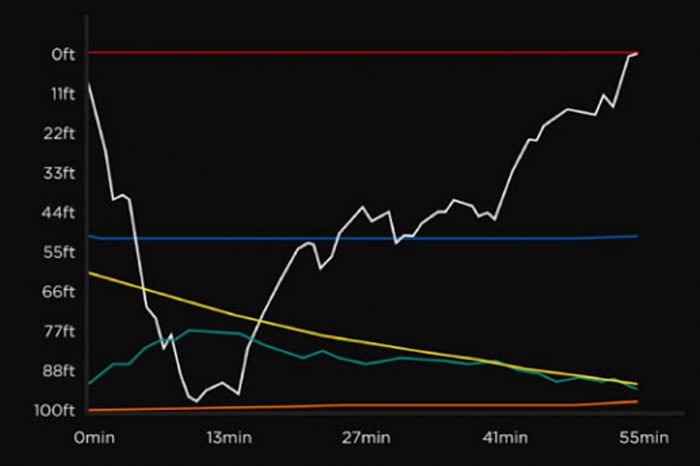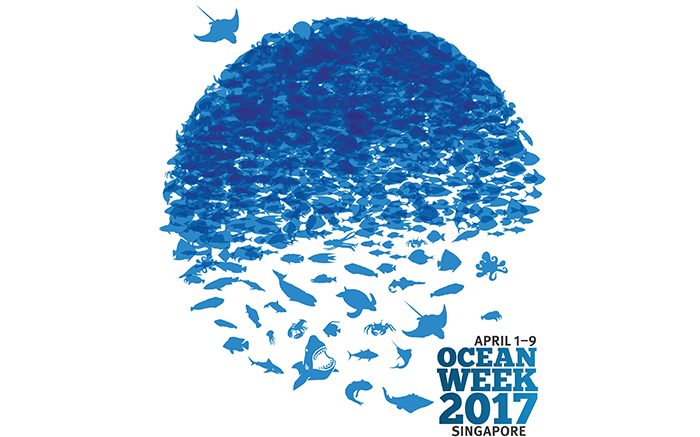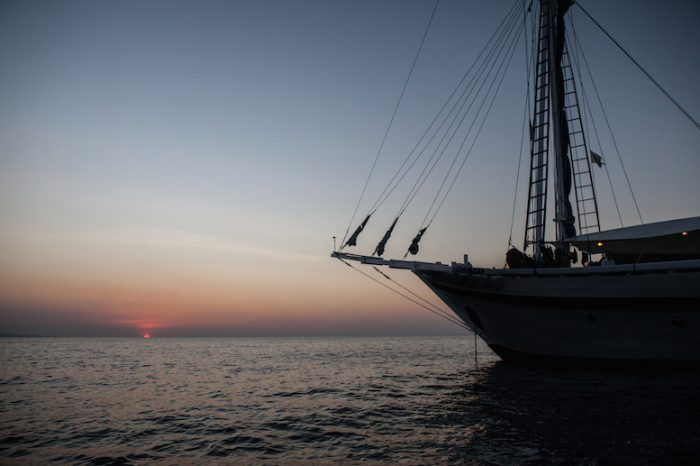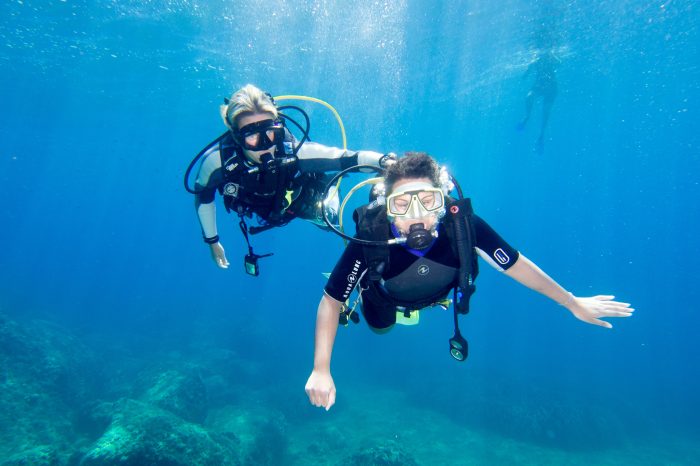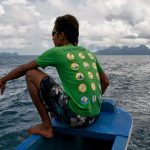Sustainable Marine Tourism: Changing the Game for Dive Operators Around the World
In 2007, my partner JJ and I packed our backpacks and jumped on a flight for Southeast Asia. As UKbased marine biologists, we had little experience of tropical marine biology, and the lure of the Coral Triangle – the most biodiverse area of coral reefs in the world – was too great to resist. As it turned out, this would not only be the trip of a lifetime, but a journey that would change our lives forever.
Diving has been a huge part of my life since I first donned fins and got my Open Water qualification in the Red Sea when I was 12. By 15, I was a British Sub-Aqua Club (BSAC) assistant instructor, which saw me spending many happy weekends exploring the UK underwater world, and teaching others to do the same. Diving had a profound influence on my strength of character and drove me towards studying marine biology.
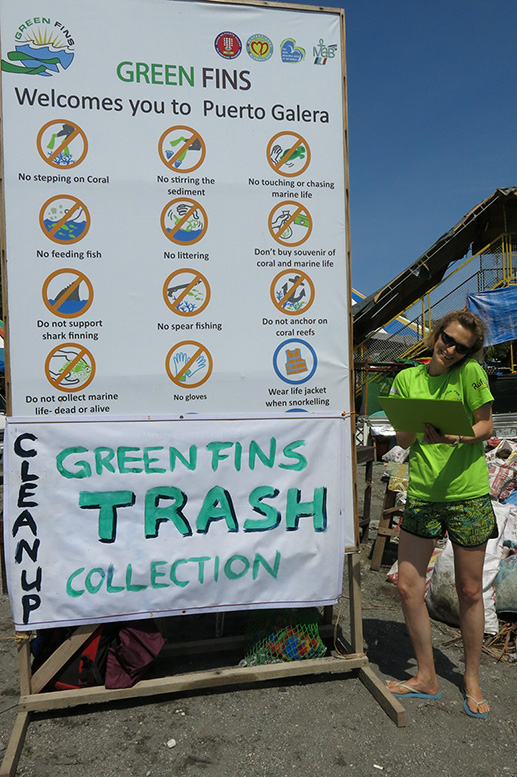
Beach and reef clean-ups are an integral part of the programme that involve staff, guests and the local community
On the way home
As our year of volunteering drew to an end in early 2008, we decided to get our Dive Master qualifications and find work as dive guides. Sadly, we weren’t successful and it was with heavy hearts that we began our journey to Bangkok to catch our return flight home. Before we headed off, we stopped in Phuket, where we met the awe-inspiring Niphon Phongsuwan at the Phuket Marine Biological Centre. He was running a United Nations Environment Programme (UNEP) conservation project called Green Fins that was promoting an environmental code of conduct within scuba-diving operations, aiming to reduce environmental impact and raise conservation awareness.
Having seen, firsthand, the destruction caused by the mass diving industry, we thought the concept of environmental standards for diving was brilliant but surely not unique. After a few days of sitting in sweaty, dark Internet cafés in Phuket searching for similar programmes, we realised that it was entirely unique – and desperately in need of support. We missed our flight and agreed to stay on as volunteers. It was the best decision we have ever made.
Laying the foundations
Over the next year, we worked hard to drive grassroots implementation across Thailand, working directly with the diving industry. We designed an assessment system to evaluate and monitor the environmental impact of independent dive businesses. Alongside this was a lot of strategic development to enable us to replicate Green Fins in other popular diving destinations.
By 2009, our work had attracted the attention of the UNEP and the UK charity The Reef-World Foundation, which had been working alongside Niphon since 2004. As part of the Reef-World team, we were awarded a US$15,000 grant by the UNEP to investigate the receptiveness of the diving industry and national authorities in Malaysia and Indonesia, and if there was indeed an environmental need for Green Fins; the answer was a resounding “yes”. Eventually, Green Fins was also introduced into Vietnam and the Maldives with tremendous success.
From divers to governments
Green Fins membership for a dive centre is completely free, and consists of annual environmental assessments and training for their staff. The outcome is a sit-down session where Green Fins assessors talk the manager through how their dive centre is doing against the Code of Conduct. Both parties then agree on three (or more) points to work on for the next assessment. To maintain their membership, dive centres have to show improvement year on year.
My favourite part of this process is the staff training. In just 45 minutes, the assessor gives an informal presentation providing solutions for dive guides, instructors, and boat captains to protect their reefs. It’s fascinating to hear the passion dive staff have for coral reefs, and their enthusiasm for learning the tools needed to manage guests in a fun and sensitive manner.
Green Fins has now been adopted into national legislation, and national budgets are shouldering operational costs in four of the six active countries. We have nurtured unique collaborations between NGOs and national governments, and dive staff and local communities. But while the national success of Green Fins was booming, finding support for our work was proving exceptionally difficult. From the outset, we had agreed that any national funds should be used for Green Fins activities, not Reef-World’s international operations.
Threatened by success
Meanwhile, government partners were requesting more support to help national expansion and dive centres were jumping on board across Southeast Asia. Overseeing these developments and maintaining communication with project partners across each of the six countries was becoming unmanageable for just the two of us; we became frustrated and jaded and desperately needed more resources. By mid-2014, we faced the real prospect of having to shut down operations. We put Reef-World into “survival mode”, cutting back on all project costs, and just continued to push for funding. The realisation that things might be coming to an end was a very bitter pill to swallow.
At the end of 2014, we received fantastic news: a coral reef partnership we were helping to develop within the UNEP was approved, making funds for Reef-World available. It secured US$80,000 to develop exciting new tools to further support the diving industry and resource managers to implement Green Fins. The pressure is off, and we’re now finally able to focus on making the programme even more effective.
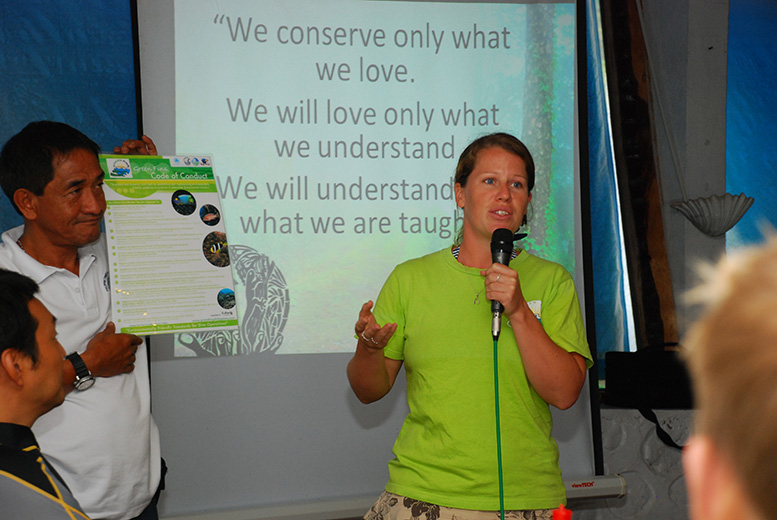
Chloe Harvey giving an impassioned presentation as part of the Green Fins training programme.
Making change starts with you
As divers, we like to think that we’re exploring the planet’s incredible marine habitats in a responsible manner. Show your support by following best practices and praising those who do the same. Choose Green Fins dive centres when you can. Don’t be afraid to speak up when you see irresponsible behaviour. This way, we can preserve our dive sites and ensure that divers for generations to come get to experience them, too.

